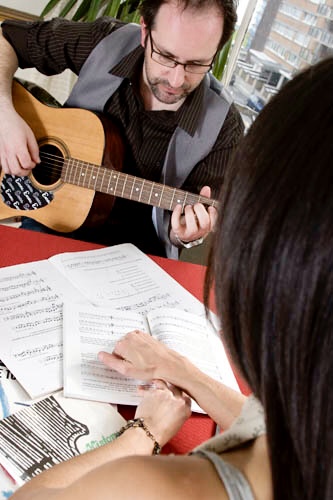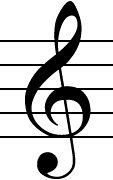Learning music theory will make you a more skilled and more knowledgeable musician, with the added bonus that you’ll be able to play new music with the same ease as reading a book. It’s a great idea for anyone wanting to understand music better, as well as for anyone wanting to improve their composing, reading, improvising, or listening skills. A good grounding in theory is also hugely helpful for musicians thinking of joining choirs or bands.
Theory lessons can be taught using whatever instrument you play, whether it’s a guitar, piano, or even your voice. Louisa specialises in coaching students for theory exams and has a 100% pass rate. Whether you’re learning for grades or just for your own development as a musician, Louisa’s way of teaching will make it feel alive, practical, and relevant.
Music theory is a broad subject, but the basic areas covered in classes are:
- note reading
- keys, scales and modes
- time signatures
- rhythm and how to write it down
- chords, including their extensions and inversions
- harmony
- voice leading
- musical analysis
- intervals and how to hear them
- aural training
- musical dictation
- transposition
- composition
- musical terms, symbols and directions
If you’re still wondering whether learning theory is for you or not, here are a few common reasons why people decide to take classes:
Pass music theory exams
A Grade 5 certificate in music theory is seen as the golden standard, and is often a requirement for anyone wanting to go beyond Grade 5 in their instrument or study music further than GCSE. Louisa can teach you all you need to know for this exam, and for the grades beyond. She’ll go through sample exam questions and past papers with you, so that when you take your test you are fully prepared. Louisa also offers extra tuition for pupils studying for their music GCSEs, A Levels or college exams.
Play new music and expand your repertoire
When you learn how to read music you will be able to pick up a piece of sheet music, or download a score from the internet, and be able to play it instantly.
Write your own music
Not only will you be able to immortalise your own compositions by writing them down in a universally understood language, you will also be confident that you are writing better music. Among other things, theory teaches you about melody, harmony, modulation and decoration, all of which will make your own writing more exciting and rich.
Improve your playing
As well dramatically improving your sight-reading, learning theory also makes your improvising more skilled and varied. Alongside giving you a better understanding of rhythm and harmony, lessons will introduce you to new scales and modes, such as the Hungarian Gypsy scale or the Mixolydian mode, so you can explore different sounds with your playing.
Join bands, choirs or orchestras
If you can read music, you can feel confident turning up to any choir or band practice as you’ll be able to instantly join in. There’s nothing quite so amazing as complete strangers coming together for the first time, being given a piece of sheet music which they’ve never seen before, and instantly being able to produce the most beautiful music. If someone hadn’t invented a way of putting music down on paper, the great works of composers such as Beethoven and Tchaikovsky would have been lost forever.
Understand music
Musicians who have learnt music theory are able to see music in a whole new light. When either playing, reading, or listening to music, the rhythm, beat, tonality, harmony, motifs and structure are all laid bare, bringing a much deeper understanding and appreciation of music and what it can do.
“It’s like learning a new language – one which everyone from Mozart to Zappa could speak!” Thom, student, age 48

